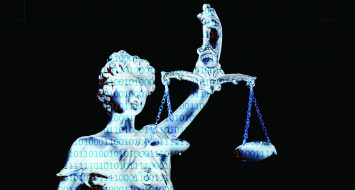Lawyers are Increasingly the Targets of Email/Fraudulent Check Schemes
Joseph R. Marconi & Brian C. Langs
March 17, 2022
Reading time: 4 minutes

Lawyers are increasingly receiving emails from alleged potential foreign clients looking to collect debts from customers. More likely than not, the email is the first step in a fraudulent scheme which involves a deposit and withdrawal from your special client fund account. A basic knowledge of Article 4 of the UCC and simple precautions can help lawyers avoid becoming a victim of these schemes and protect against other potential fraudulent deposits into lawyer’s special accounts, including fraudulent settlement checks and retainer checks.
The scenario is a familiar one by now for many lawyers. There are variations, but it generally unfolds something like this:
- A lawyer receives an email from a new potential foreign client looking to collect an outstanding debt from a customer in the lawyer’s jurisdiction.
- The lawyer – always anxious for new business – agrees to represent the new client and collect the debt.
- Shortly thereafter, the client informs the lawyer that its customer has agreed to voluntarily pay the outstanding debt and that the customer will shortly be forwarding a check to the lawyer. The client further asks that the lawyer deposit the check into his account and, after confirming that the check has cleared, wire the funds to the client after deducting the lawyer’s fees.
- Sure enough, a check soon arrives from the customer. The lawyer deposits the check, waits for it to clear, and then wires the money to the client.
- Sounds like a great way to build your practice, right? Think again. Invariably, lawyers who respond to these sorts of email solicitations and engage in the above-described scenario are receiving calls from their banks informing them that the checks they deposited in their accounts are counterfeit and demanding immediate reimbursement from the lawyers. And the banks are perfectly within their rights to do so!
The mistake most lawyers make is that they assume that once they hear from their bank that the deposited check has “cleared” and the funds are available there is no risk in wiring those funds. This is simply not true. The Expedited Funds Availability Act, 12 U.S.C. 4001, et seq., requires banks to disclose when deposited funds will be made available. However, a bank’s making funds available is only provisional until the check is actually paid by the payor bank (i.e., final settlement). UCC § 4-201 provides that prior to final settlement, the depositor’s bank merely acts as the customer’s agent for collection of the check and any advancement of funds by the depositor’s bank is provisional. UCC § 4-214 further provides that if there is no final settlement (i.e., the payor bank does not pay the check), the depositor’s bank may charge back the sum of any provisional advancement of funds or demand a refund from the customer.
As applied to our illustration above, this means that the attorney who deposits the check and wires the funds to his “client” once the check clears may ultimately be liable to the bank for the amount of the fraudulent check. The bank may either charge the lawyer’s account if sufficient funds are available in the lawyer’s account or demand a refund and pursue legal action against the lawyer for the amount of the check.
Lawyers can take some steps to avoid being victims of these fraudulent check schemes. First, be extremely wary of taking on any representation from a foreign client who contacts you only via email. As with any new client, a lawyer should investigate the client thoroughly. This includes determining the actual existence of the client and the validity of its operations. A diligent lawyer should call references for the client, check public records, and obtain supporting documentation of the alleged debt that is owed to the client.
Second, never assume that simply because a check has cleared and funds are available that a check has been paid by a payor bank. Upon receiving a check from a suspicious client, a diligent lawyer should call the payor bank to verify the account and determine if the check is a forgery. A lawyer should also not draw on deposited funds from a suspicious client until he or she receives confirmation from the bank that there has been a “final settlement” and the deposited check has actually been paid by the payor bank.
Finally, lawyers should be cognizant that any check they receive may ultimately be dishonored and they may be liable if they draw upon any provisional funds supplied by the depositor bank. Prudent practice dictates that attorneys ensure that they receive “final settlement” on retainer checks from clients, and settlement checks from opposing parties and attorneys, before disbursing funds from those checks.
Joseph Marconi is a Shareholder with Johnson & Bell, Ltd. specializing in legal malpractice disputes and commercial litigation. After spending three hours looking for his old fax machine in storage, he realized his wife had thrown it out. He’s buying a new one.
Additional Technology content

Hey Alexa – When Can I Draft Documents With AI?
No attorney can be fully insulated from a legal malpractice claim or grievance, but there are certain precautions that can be taken to minimize exposure to such claims. One important risk management tool is the strict screening of all cases before they are accepted into the practice. Rejecting cases with certain “red flags” can go a long way in preventing otherwise avoidable malpractice claims and grievances. Here are eight important questions to ask before accepting any new case.

What can lawyers gAIn from artificial intelligence?
So, how do you craft a meaningful billing entry that gets you paid and protects against future claims? It is as easy as 1-2-3.

iLawyer: the Ethical Use of Technology in Your Practice
A lawyer’s duty to provide competent representation now includes an ethical obligation with respect to technology. In 2012, the ABA added Comment 8 to Rule 1.1 of its Model Rules requiring lawyers to stay current with relevant technology.
Information provided by AttPro Ally is not intended as legal advice. This publication provides best practices for use in connection with general circumstances and ordinarily does not address specific situations. Specific situations should be discussed with legal counsel licensed in the appropriate jurisdiction. By publishing practice and risk prevention tips, Attorney Protective neither implies nor provides any guarantee that claims can be prevented by the use of the suggested practices. Though the contents of AttPro Ally have been carefully researched, Attorney Protective makes no warranty as to its accuracy, applicability, or timeliness. Anyone wishing to reproduce any part of the AttPro Ally content must request permission from Attorney Protective by calling 877-728-8776 or sending an email to [email protected].
© 2026 AttPro Ally. All rights reserved.